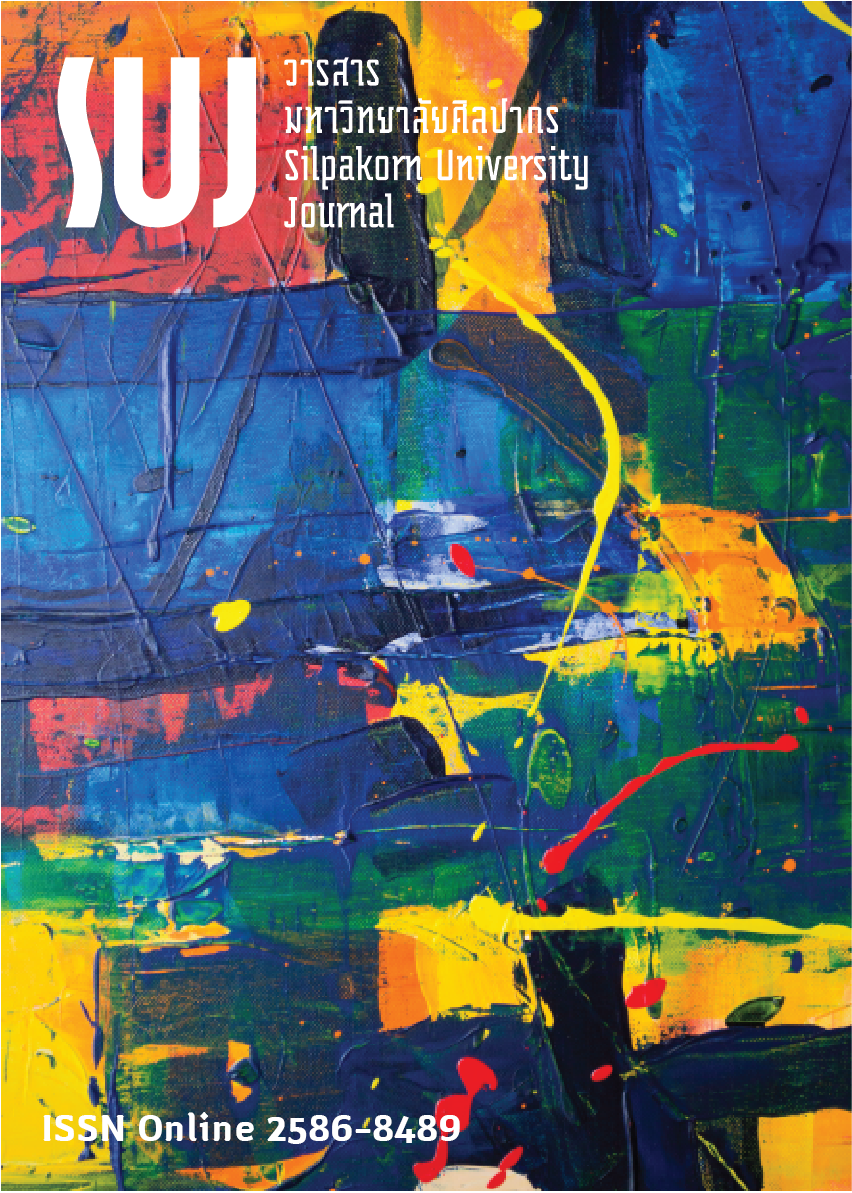พันธมิตรธุรกิจวิสาหกิจชุมชนของแม่บ้านทหารบกในจังหวัดชายแดนภาคใต้ (Alliances of thai army housewives’ community enterprises in the southern border provinces)
Main Article Content
Abstract
พันธมิตรธุรกิจเป็นกลยุทธ์ที่ช่วยเพิ่มความเข้มแข็งทางธุรกิจและศักยภาพในการแข่งขัน งานวิจัยนี้จึงมีวัตถุประสงค์เพื่อ 1) ศึกษาการดำเนินงานทางธุรกิจของวิสาหกิจชุมชนของแม่บ้านทหารบกในจังหวัดชายแดนภาคใต้ 2) ศึกษาทัศนคติที่มีต่อพันธมิตรธุรกิจระหว่างวิสาหกิจชุมชนของแม่บ้านทหารบกในจังหวัดชายแดนภาคใต้ และ 3) พัฒนาพันธมิตรธุรกิจระหว่างวิสาหกิจชุมชนของแม่บ้านทหารบกในจังหวัดชายแดนภาคใต้ ผู้วิจัยเก็บข้อมูลเชิงคุณภาพด้วยการสังเกตการณ์แบบไม่มีส่วนร่วม การวิเคราะห์ข้อมูลจากเอกสาร การสัมภาษณ์กลุ่ม และการสนทนากลุ่มสมาชิกวิสาหกิจชุมชนของแม่บ้านทหารบกในจังหวัดชายแดนภาคใต้ จำนวน 3 กลุ่ม รวม 41 คน รวมทั้งใช้แบบสอบถามเพื่อประเมินความพึงพอใจของลูกค้าที่มีต่อผลิตภัณฑ์หรือบรรจุภัณฑ์ ผลการศึกษาพบว่า 1) ทุกกลุ่มได้รับเงินลงทุนเริ่มต้นจากหน่วยงานต้นสังกัด จัดทำบัญชี มีกำลังการผลิตเพียงพอ สินค้ามีมาตรฐานผลิตภัณฑ์ชุมชนรับรอง ส่งเสริมการตลาดอย่างต่อเนื่อง จัดจำหน่ายสินค้าโดยตรงกับลูกค้าและผ่านคนกลางทางการตลาด สมาชิกกลุ่มแบ่งหน้าที่การทำงานอย่างชัดเจน จ่ายผลตอบแทนตามชิ้นงานที่ผลิตและแบ่งผลกำไร รวมทั้งพัฒนาความสามารถในการผลิตให้แก่สมาชิกอย่างสม่ำเสมอ 2) สมาชิกของทุกกลุ่มมีทัศนคติที่ดีและยินดีเข้าร่วมเป็นพันธมิตรธุรกิจระหว่างกัน และ 3) การพัฒนาพันธมิตรธุรกิจระหว่างวิสาหกิจชุมชนได้ผลิตผลิตภัณฑ์ส่งให้แก่กัน เพื่อนำไปพัฒนาเป็นผลิตภัณฑ์ใหม่หรือบรรจุภัณฑ์ใหม่ที่มีมูลค่าสูงขึ้น ผลการพัฒนาพันธมิตรธุรกิจทำให้วิสาหกิจชุมชนแต่ละกลุ่มมีรายได้เพิ่มขึ้น ลูกค้ามีความพึงพอใจกับผลิตภัณฑ์หรือบรรจุภัณฑ์ใหม่ส่วนใหญ่ที่พัฒนาขึ้น สมาชิกได้เรียนรู้การทำงานร่วมกับคู่พันธมิตรและพยายามพัฒนาความสามารถในการผลิตเพื่อชื่อเสียงของกลุ่มและการยอมรับของคู่พันธมิตร ตลอดจนเกิดความสัมพันธ์ที่ดีระหว่างสมาชิกของแต่ละวิสาหกิจชุมชน
Business alliance is a strategy for enhancing business strength and competitiveness. Therefore, this study aims 1) to study the business operations of community enterprises that belong to army housewives in the southern border provinces; 2) to study the housewives’ attitudes towards the establishment of business alliances among the community enterprises of army housewives in the southern border provinces and; 3) to develop the business alliances of army housewives’ community enterprises in the southern border provinces. The techniques used to collect the qualitative data were non-participant observation, document analysis, group interviews, and focus groups with 3 community enterprises. The total number of army housewife members is 41. Questionnaires were also used to evaluate customer satisfaction. The results revealed that 1) all groups received initial fund from the military unit, doing the accounts and the members working together to plan the production. Apart from this, there was enough production capacity. The products met standard quality and assurance based on community approval. There was a constantly continuous marketing promotion. Products can be distributed into two ways, namely via direct the customers and the middlemen. Group members were clearly and equally divided their works. Shares and profits were distributed depending upon works’ quality and quantity. Colleagues were regularly trained in order to improve their work performance accordingly. 2) Group’s members expressed their good attitude towards works and were favour to be the business alliance. 3) The alliance was characterized by networking where one group sends its product to the other groups in order to develop a new product or packaging with higher value. The result of the development of the business alliance has increased the income of each community enterprise due to higher value products and greater customer satisfaction. Members learnt to work with alliances and attempted to improve their ability to produce for the group’s reputation and acceptance of alliances, further enhancing the relationship between members of each community enterprise.
Downloads
Article Details
References
Chaichanapan, Patcha. & Thongkong, Supa. (2014). Collaboration Patterns in Construction Industry for Sustainable Business Alliance Development (รูปแบบความร่วมมือระหว่างองค์กรในอุตสาหกรรมก่อสร้างเพื่อพัฒนาเป็นพันธมิตรทางธุรกิจที่ยั่งยืน). In Proceedings of the DPU-Wuhan International Conference on Oriental Leadership, pp. 103-112. Bangkok: Dhurakij Pundit University.
Mesinsee, Suwit. (2015). Thailand 4.0 Model, Mesinsee’s Thinking Crystallization (โมเดลประเทศไทย 4.0 ผลึกความคิด สุวิทย์ เมษินทรีย์). [Online]. Retrieved July 21, 2017 from http://www.thansettakij.com/2015/08/31/9309
Office of Industrial Economics. (2015). Strategic Alliances Guidelines for Thai Food and Beverage Industry Entrepreneurs with Partners in Vietnam (แนวทางการสร้างพันธมิตรเชิงกลยุทธ์ของผู้ประกอบการอุตสาหกรรมอาหารและเครื่องดื่มไทยกับคู่ค้าในเวียดนาม). (Research report). Bangkok: Office of Industrial Economics.
Office of the National Economic and Social Development Board. (2017). The Twelve National Economic and Social Development Plan (2017-2021) (แผนพัฒนาเศรษฐกิจและสังคมแห่งชาติฉบับที่สิบสอง พ.ศ. 2560-พ.ศ. 2564). Bangkok: Office of the National Economic and Social Development Board.
Phothinam, Panadda. (2017). The Study of the Managerial Development of Community Enterprise in Kalasin Province (การศึกษาและพัฒนาการบริหารจัดการกลุ่มวิสาหกิจชุมชนจังหวัดกาฬสินธุ์). Journal of the Way Human Society, 5(1): 191-206.
Pride, W. M., Hughes, R. J. & Kapoor, J. R. (2012). Introduction to Business. (11th ed.). OH: South-Western.
Saererat, Siriwan., Hirunkitti, Sonchai. & Tungsintrup, Tanawan. (2007). Management and Organizational Behavior (การจัดการและพฤติกรรมองค์การ). Bangkok: Teera Film and Sitex.
Secretariat Office of Community Enterprise Promotion. (2005). Community Enterprise Promotion Act, B.E. 2548 (พระราชบัญญัติส่งเสริมวิสาหกิจชุมชน พ.ศ. 2548). Bangkok: Department of Agriculture Extension, Ministry of Agriculture and Cooperatives.
Seedee, Rattana. (2016). Business Alliance: Elements of Building Alliances, Learning Process and Alliances Performance (พันธมิตรทางธุรกิจ: องค์ประกอบของการสร้างพันธมิตร กระบวนการเรียนรู้ และประสิทธิภาพในการดำเนินงานด้านพันธมิตร). Panyapiwat Journal, 8(3): 254-264.
Seedee, Rattana. (2016a). Guideline for Thai Spa and Massage to Build Business Alliances in the ASEAN Economic Community. Veridian E-Journal, Silpakorn University, 9(3): 756-779.
Srijaroon, Jariya. (2016). Perception of Using Packaging for Environment of Customer in Bangkok Metropolitan Areas (การรับรู้การเลือกใช้บรรจุภัณฑ์เพื่อสิ่งแวดล้อมของผู้บริโภคในเขตกรุงเทพมหานคร). Southeast Bangkok Journal, 2(2): 16-33.
Sumranruen, Suparadee., Tangpinyophuttikun, Pichai. & Chailom, Peerawat. (2013). Effects of Business Alliance Strategy on Competitive Advantage of the Board of Investment (BOI) Businesses in Thailand (ผลกระทบของกลยุทธ์พันธมิตรทางธุรกิจที่มีต่อความได้เปรียบทางการแข่งขันของธุรกิจที่ได้รับการส่งเสริมการลงทุนในประเทศไทย). Journal of Accountancy and Management, Mahasarakham University, 5(4): 66-77.
Swangkong, Kanlaya. & Jadesadalug, Viroj. (2018). Business Alliances Strategy: Alternative for Tour Operators in Thailand (กลยุทธ์พันธมิตรทางธุรกิจ: ทางเลือกสำหรับผู้ประกอบการธุรกิจนำเที่ยวของไทย), Veridian E-Journal,Silpakorn University, 11(1): 150-167.
Thai Army Wives Association. (2016). The Main Projects of Thai Army Wives Association (โครงการหลักของสมาคมแม่บ้านทหารบก). [Online]. Retrieved November 28, 2018 from http://www.thaiarmywives.org
Tangrujikun, Thanun., Kumsri, Rasmon., Rattana, Phafun. & Sakulsak, Irin. (2016). Management Potential of Community Enterprise Nameunsri Cloth Weaving Group, Trang Province (การศึกษาศักยภาพการบริหารจัดการวิสาหกิจชุมชนกลุ่มผ้าทอนาหมื่นศรี จังหวัดตรัง). In Proceedings of the Tenth Hatyai National and International Conference, pp. 1326-1336. Songkhla: Hatyai University.
Wonganutaroj, Preeyaporn. (2010). Educational Psychology (จิตวิทยาการศึกษา). Bangkok: Soonsuesermkrungthep.
Yala Task Force. (2016). Driving the Southern Border Provinces’ Economic (การขับเคลื่อนงานด้านเศรษฐกิจจังหวัดชายแดนใต้). Pattani: Yala Task Force.


